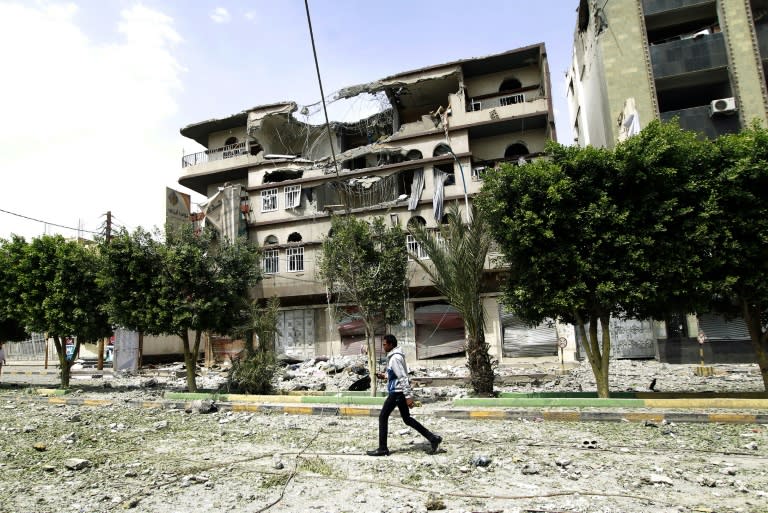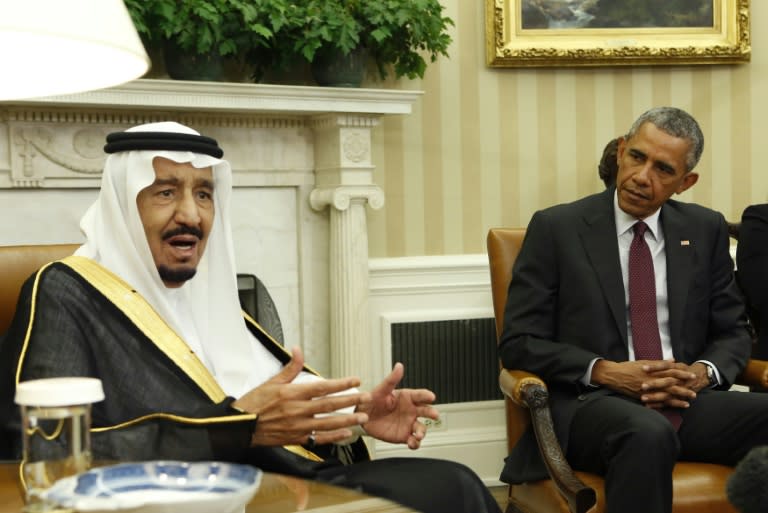UAE pounds Yemen rebels after coalition's deadliest day
UAE warplanes carried out air strikes on Yemeni rebels Saturday as Emiratis mourned 45 of their soldiers, who were among dozens killed in the deadliest day yet for the Saudi-led coalition. Media in Riyadh said 10 Saudi soldiers died in Friday's missile attack in the battleground eastern oil province of Marib. The strike hit an arms depot, triggering huge explosions that the Yemeni government said also killed five Bahraini troops. The UAE denounced the "cowardly" attack, which it said would not sap its commitment to the coalition's mission to restore exiled President Abedrabbo Mansour Hadi. The Iran-backed Shiite Huthi rebels hailed the strike as "revenge" for six months of deadly coalition air raids. Coalition spokesman General Ahmed Assiri told Saudi online media Saturday the war against the rebels would not ease. "The mission of the coalition forces is to restore peace and stability to Yemen," daily Al-Riyadh quoted him as saying. "They will continue their military operations until their objectives are achieved." The coalition launched an air war when Hadi fled to Saudi Arabia in March after the rebels entered his last refuge, Yemen's second city Aden. After loyalists recaptured the southern port in July, the coalition launched a ground operation that has seen the rebels pushed back from five southern provinces, although they still control Sanaa and much of the north and centre. UAE troops have played a leading role in the operation and seven had already been killed. - UAE mourns - Friday's losses were the heaviest since the formation of the United Arab Emirates in 1971, and as the bodies arrived home on Saturday three days of national mourning began. Huge crowds attended the funerals as the "courage" and "bravery" of the fallen were hailed on social networks. The British embassy said in a tweet that its flags in Dubai and Abu Dhabi had been lowered to half mast as a mark of respect. UAE warplanes launched pre-dawn raids on Marib, Sanaa, the rebel stronghold of Saada in the far north and the central city of Ibb, state media reported. Coalition aircraft unleashed waves of air strikes on Sanaa from the early hours, sowing panic. "These are the heaviest air strikes that Sanaa has endured," one local official told AFP. Warplanes also bombed the position from which the missile is believed to have been fired, a local official and witnesses said. The Baihan district of Shabwa province, which borders Marib, is one of the last rebel redoubts in the south. "The missile, with a range of 60 kilometres (37 miles), was indeed fired from the Baihan area," a loyalist officer told AFP. He said at least 12 rebels were killed in Saturday's raids there. In the UAE capital Abu Dhabi, an honour guard stood by as pallbearers carried the flag-draped coffins off a military aircraft. "A cowardly attack will not deter us, nor will it stop us from realising our goals," vowed Minister of State for Foreign Affairs Anwar Gargash. Abu Dhabi Crown Prince Sheikh Mohammed bin Zayed al-Nahyan, acting armed forces chief, vowed that "these events will only make us more steadfast in our stand for justice". - 'Revenge' strike - The Huthis said they had used a Tochka missile to attack the Safer camp in Marib. They hailed the strike as "revenge for the crimes and the war of extermination being carried out by the Saudi aggressor and its mercenaries". Marib has seen fierce fighting as loyalist forces and their coalition allies have advanced north. Loyalist military sources said the coalition had reinforced Safer this week with tanks, armoured vehicles, troop carriers, rocket launchers and Apache helicopters. These were to boost "the counter-offensive launched by loyalist forces and the coalition to advance on Sanaa," one military official said. Friday's losses came as Saudi King Salman met US President Barack Obama in Washington, with Yemen high on the agenda. Obama said the two sides "share concerns" about the need to restore a functioning government in Yemen and relieve its humanitarian crisis. More than 4,500 people have been killed in the conflict, including hundreds of children, according to the United Nations, which has warned that Yemen is on the brink of famine. Washington has supported the coalition effort, but repeatedly warned about the impact on civilians. The White House said Obama telephoned Crown Prince Mohammed on Saturday to offer his condolences, and state news agency WAM reported that Hadi travelled to Abu Dhabi to do the same. It said the prince told Hadi: "We will be with you till the end."






